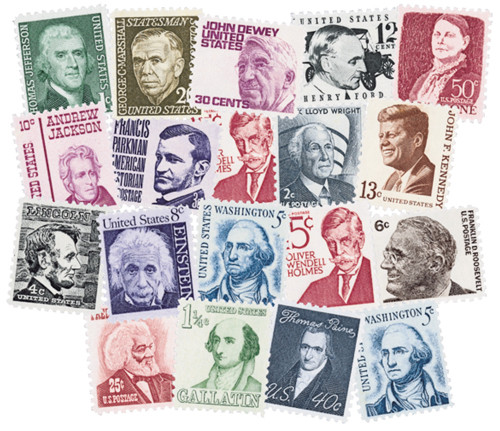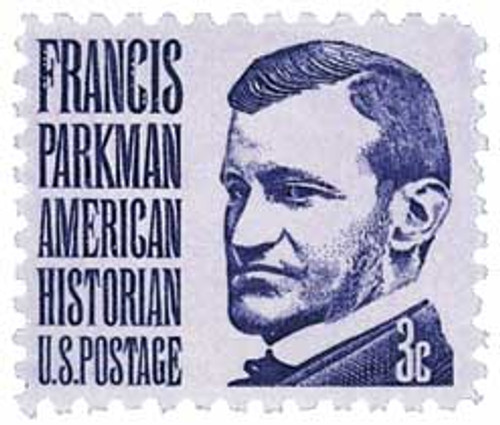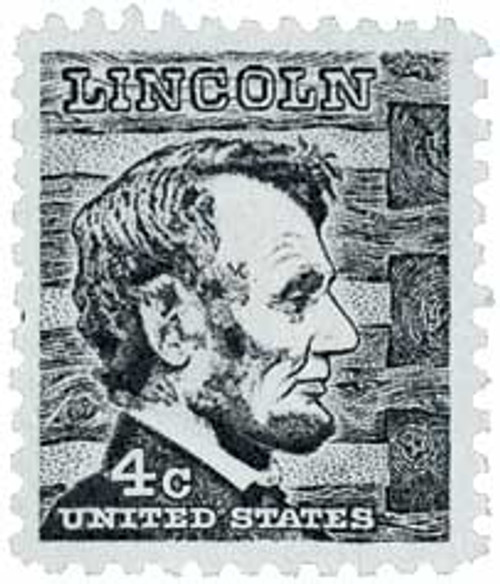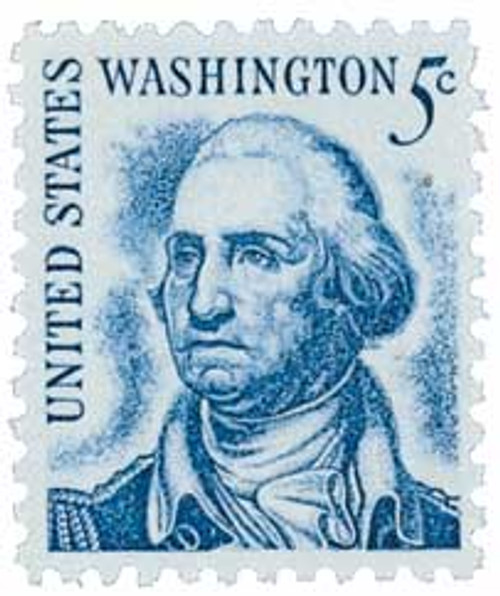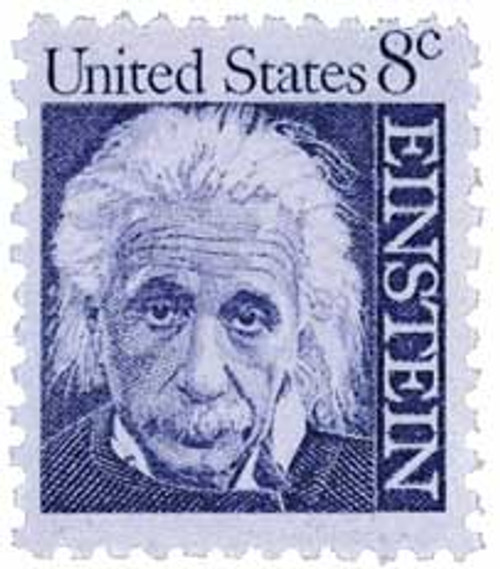
# 1290 FDC - 1967 25c Prominent Americans: Frederick Douglass
25¢ Frederick Douglass
Prominent Americans Series
City: Washington, DC
Printed By: Bureau of Engraving and Printing
Printing Method: Rotary Press
Color: Rose lake
Happy Birthday Frederick Douglass!
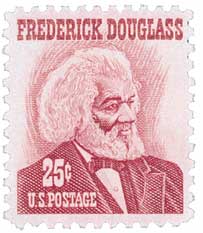
While the exact date of Frederick Douglass’ birth is unknown, it’s generally considered to be February 14, 1818. Douglass chose the date himself, reportedly because his mother used to call him her “little valentine.”
Born Frederick Augustus Washington Bailey (he adopted the surname Douglass years later), he was separated from his mother at a young age and lived with his maternal grandmother. When he was seven, he began working on the Wye House plantation as a slave.
From there Douglass went to work for the Aud family in Baltimore. Mrs. Aud taught him to read, against her husband’s wishes, and eventually discouraged the practice. But Douglass continued to learn from neighborhood children and the men he worked with. Douglass then began teaching other slaves to read for about six months, until their masters found out and broke up their meetings.
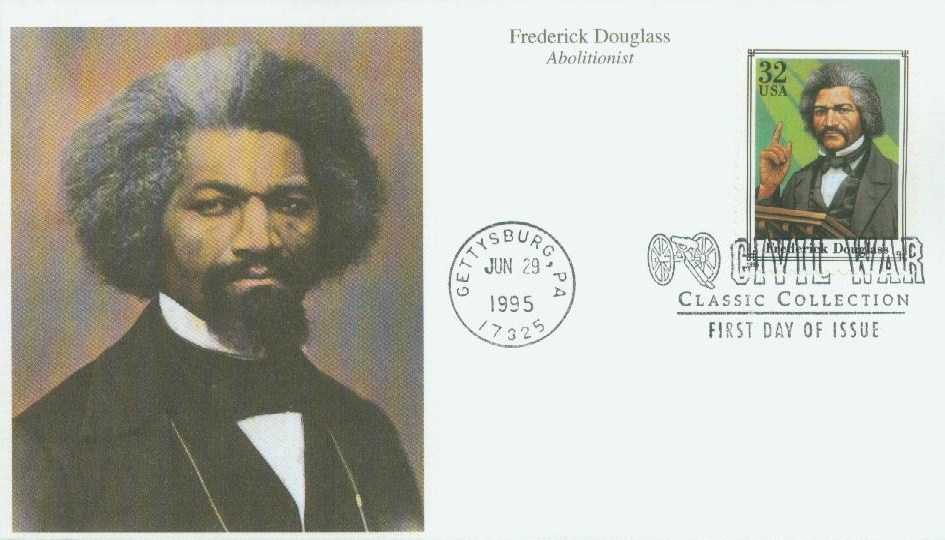
Douglass was loaned out to several different masters during his life in Maryland. In 1837, Douglass met Anna Murray – a free African American woman living in Baltimore – and fell in love. Her free status gave Douglass the motivation he needed to escape Maryland on September 3, 1838. He ended up in New York City less than 24 hours after he left. After Murray arrived they got married and took the name of Johnson. They then moved to New Bedford, Massachusetts and adopted the name Douglass, after the character in the poem, The Lady of the Lake.
Douglass joined the African Methodist Episcopal Zion Church and became a licensed preacher in 1839. He gained valuable experience as an orator and eventually traveled the country with other speakers talking about his life as a slave. In 1845 Douglass published his first autobiography. It was an instant bestseller that was reprinted nine times. However, the book brought attention to his former owner, so Douglass, at the suggestion of his friends, went to Ireland and Britain for two years to deliver rousing lectures. His supporters then raised the funds to buy his freedom, allowing him to return to America in 1847 and begin publishing his first abolitionist paper, The North Star.
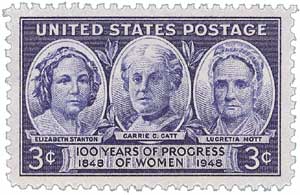
The following year, Douglass was the only African American to attend the Seneca Falls Convention on women’s rights. At first, many at the convention did not want suffrage included in the “Declaration of Sentiments.” They thought it was too radical a step and that it would discourage people from taking their cause seriously. Douglass stepped up and spoke in support of the idea. He even went so far as to say he wouldn’t feel right about being able to vote if women couldn’t also. His words inspired the attendees and ultimately persuaded them to keep the right to vote in the document.
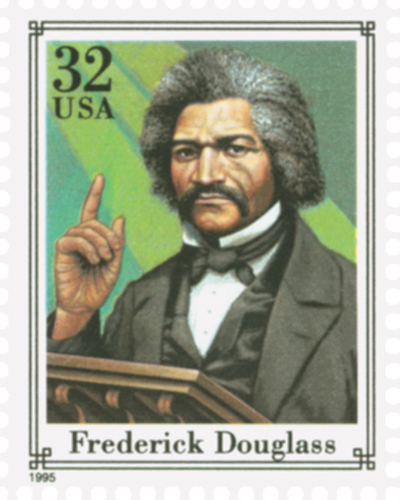
Throughout the 1850s, Douglass worked with several abolitionist groups. He also became an early supporter of school desegregation. He was appalled at the poor conditions of African American educational facilities compared to those for white children. He considered the matter to be more important than suffrage. Also in the 1850s, Douglass befriended John Brown, and disapproved of his raid on Harpers Ferry. He fled the country for a time, fearing he might be persecuted just for knowing and meeting with Brown, though he didn’t participate in the raid.
By the time the Civil War began, Douglass was one of the most famous African Americans in the country. President Lincoln sought his advice on the treatment of black soldiers and called Douglass the most meritorious man of the nineteenth century. Douglass also helped recruit men to fight for the North. Though Douglass had a good relationship with Lincoln, he supported John C. Frémont in the election of 1864 because Lincoln’s didn’t publicly endorse suffrage for African American freedmen. However, after Lincoln’s death, Douglass called him America’s “greatest President.”
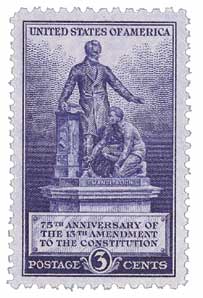
On April 14, 1876, Douglass was the main speaker at the unveiling of the Lincoln Emancipation Statue in Capitol Hill Park, Washington, D.C. He spoke briefly of President Lincoln’s imperfections, but mostly talked about how everything had led to slavery’s end and the restoration of the Union. Over 25,000 people attended the event, including President Ulysses S. Grant, his cabinet, and members of Congress.
Douglass continued to work for African American and women’s equality. He also received several political appointments, including president of the Freedman’s Savings Bank and chargé d’affaires for the Dominican Republic. He was an ardent supporter of Ulysses S. Grant’s run for the presidency and applauded his Civil Rights and Enforcements Acts. In 1872, Douglass was the first African American to be nominated for Vice President.
In 1877, Frederick Douglass became the first African American U.S. Marshal. He was appointed by President Rutherford B. Hayes and was responsible for Marshal duties in Washington, D.C. The only duty Douglass did not take on was that of introducing visiting dignitaries to the President.
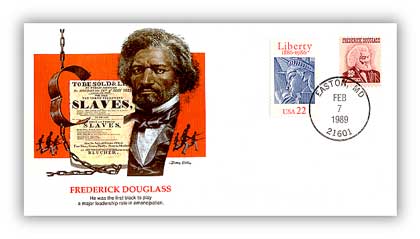
On January 2, 1893, Douglass dedicated the Haiti pavilion at the World’s Columbian Exposition in Chicago, Illinois. Douglass, who had served as the United State’s minister to the country from 1889 to 1891, made a crowd-pleasing speech about Haiti and its people. He talked about their fight for independence and the effect it had on the country and its people. Douglass spoke about the greatness of their success and how it resembled the United States’ own revolution.
Douglass made his final public appearance on February 20, 1895, at a meeting of the National Council of Women, and died after returning home that day.
Click here to read Douglass’ autobiography.
25¢ Frederick Douglass
Prominent Americans Series
City: Washington, DC
Printed By: Bureau of Engraving and Printing
Printing Method: Rotary Press
Color: Rose lake
Happy Birthday Frederick Douglass!

While the exact date of Frederick Douglass’ birth is unknown, it’s generally considered to be February 14, 1818. Douglass chose the date himself, reportedly because his mother used to call him her “little valentine.”
Born Frederick Augustus Washington Bailey (he adopted the surname Douglass years later), he was separated from his mother at a young age and lived with his maternal grandmother. When he was seven, he began working on the Wye House plantation as a slave.
From there Douglass went to work for the Aud family in Baltimore. Mrs. Aud taught him to read, against her husband’s wishes, and eventually discouraged the practice. But Douglass continued to learn from neighborhood children and the men he worked with. Douglass then began teaching other slaves to read for about six months, until their masters found out and broke up their meetings.

Douglass was loaned out to several different masters during his life in Maryland. In 1837, Douglass met Anna Murray – a free African American woman living in Baltimore – and fell in love. Her free status gave Douglass the motivation he needed to escape Maryland on September 3, 1838. He ended up in New York City less than 24 hours after he left. After Murray arrived they got married and took the name of Johnson. They then moved to New Bedford, Massachusetts and adopted the name Douglass, after the character in the poem, The Lady of the Lake.
Douglass joined the African Methodist Episcopal Zion Church and became a licensed preacher in 1839. He gained valuable experience as an orator and eventually traveled the country with other speakers talking about his life as a slave. In 1845 Douglass published his first autobiography. It was an instant bestseller that was reprinted nine times. However, the book brought attention to his former owner, so Douglass, at the suggestion of his friends, went to Ireland and Britain for two years to deliver rousing lectures. His supporters then raised the funds to buy his freedom, allowing him to return to America in 1847 and begin publishing his first abolitionist paper, The North Star.

The following year, Douglass was the only African American to attend the Seneca Falls Convention on women’s rights. At first, many at the convention did not want suffrage included in the “Declaration of Sentiments.” They thought it was too radical a step and that it would discourage people from taking their cause seriously. Douglass stepped up and spoke in support of the idea. He even went so far as to say he wouldn’t feel right about being able to vote if women couldn’t also. His words inspired the attendees and ultimately persuaded them to keep the right to vote in the document.

Throughout the 1850s, Douglass worked with several abolitionist groups. He also became an early supporter of school desegregation. He was appalled at the poor conditions of African American educational facilities compared to those for white children. He considered the matter to be more important than suffrage. Also in the 1850s, Douglass befriended John Brown, and disapproved of his raid on Harpers Ferry. He fled the country for a time, fearing he might be persecuted just for knowing and meeting with Brown, though he didn’t participate in the raid.
By the time the Civil War began, Douglass was one of the most famous African Americans in the country. President Lincoln sought his advice on the treatment of black soldiers and called Douglass the most meritorious man of the nineteenth century. Douglass also helped recruit men to fight for the North. Though Douglass had a good relationship with Lincoln, he supported John C. Frémont in the election of 1864 because Lincoln’s didn’t publicly endorse suffrage for African American freedmen. However, after Lincoln’s death, Douglass called him America’s “greatest President.”

On April 14, 1876, Douglass was the main speaker at the unveiling of the Lincoln Emancipation Statue in Capitol Hill Park, Washington, D.C. He spoke briefly of President Lincoln’s imperfections, but mostly talked about how everything had led to slavery’s end and the restoration of the Union. Over 25,000 people attended the event, including President Ulysses S. Grant, his cabinet, and members of Congress.
Douglass continued to work for African American and women’s equality. He also received several political appointments, including president of the Freedman’s Savings Bank and chargé d’affaires for the Dominican Republic. He was an ardent supporter of Ulysses S. Grant’s run for the presidency and applauded his Civil Rights and Enforcements Acts. In 1872, Douglass was the first African American to be nominated for Vice President.
In 1877, Frederick Douglass became the first African American U.S. Marshal. He was appointed by President Rutherford B. Hayes and was responsible for Marshal duties in Washington, D.C. The only duty Douglass did not take on was that of introducing visiting dignitaries to the President.

On January 2, 1893, Douglass dedicated the Haiti pavilion at the World’s Columbian Exposition in Chicago, Illinois. Douglass, who had served as the United State’s minister to the country from 1889 to 1891, made a crowd-pleasing speech about Haiti and its people. He talked about their fight for independence and the effect it had on the country and its people. Douglass spoke about the greatness of their success and how it resembled the United States’ own revolution.
Douglass made his final public appearance on February 20, 1895, at a meeting of the National Council of Women, and died after returning home that day.
Click here to read Douglass’ autobiography.






